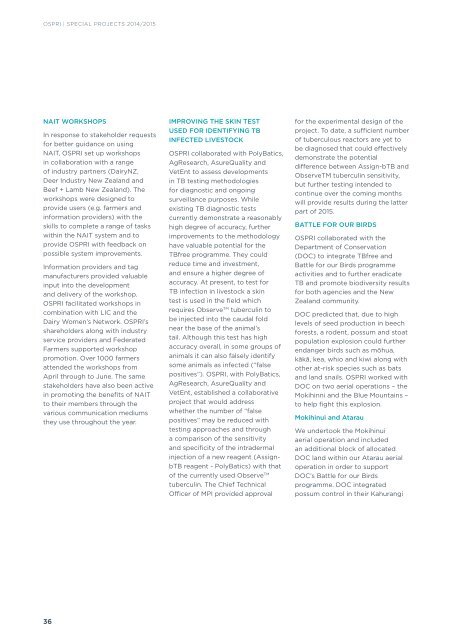Create successful ePaper yourself
Turn your PDF publications into a flip-book with our unique Google optimized e-Paper software.
OSPRI | SPECIAL PROJECTS <strong>2014</strong>/<strong>2015</strong><br />
NAIT WORKSHOPS<br />
In response to stakeholder requests<br />
for better guidance on using<br />
NAIT, OSPRI set up workshops<br />
in collaboration with a range<br />
of industry partners (DairyNZ,<br />
Deer Industry New Zealand and<br />
Beef + Lamb New Zealand). The<br />
workshops were designed to<br />
provide users (e.g. farmers and<br />
information providers) with the<br />
skills to complete a range of tasks<br />
within the NAIT system and to<br />
provide OSPRI with feedback on<br />
possible system improvements.<br />
Information providers and tag<br />
manufacturers provided valuable<br />
input into the development<br />
and delivery of the workshop.<br />
OSPRI facilitated workshops in<br />
combination with LIC and the<br />
Dairy Women’s Network. OSPRI’s<br />
shareholders along with industry<br />
service providers and Federated<br />
Farmers supported workshop<br />
promotion. Over 1000 farmers<br />
attended the workshops from<br />
April through to June. The same<br />
stakeholders have also been active<br />
in promoting the benefits of NAIT<br />
to their members through the<br />
various communication mediums<br />
they use throughout the year.<br />
IMPROVING THE SKIN TEST<br />
USED FOR IDENTIFYING TB<br />
INFECTED LIVESTOCK<br />
OSPRI collaborated with PolyBatics,<br />
AgResearch, AsureQuality and<br />
VetEnt to assess developments<br />
in TB testing methodologies<br />
for diagnostic and ongoing<br />
surveillance purposes. While<br />
existing TB diagnostic tests<br />
currently demonstrate a reasonably<br />
high degree of accuracy, further<br />
improvements to the methodology<br />
have valuable potential for the<br />
TBfree programme. They could<br />
reduce time and investment,<br />
and ensure a higher degree of<br />
accuracy. At present, to test for<br />
TB infection in livestock a skin<br />
test is used in the field which<br />
requires Observe TM tuberculin to<br />
be injected into the caudal fold<br />
near the base of the animal’s<br />
tail. Although this test has high<br />
accuracy overall, in some groups of<br />
animals it can also falsely identify<br />
some animals as infected (“false<br />
positives”). OSPRI, with PolyBatics,<br />
AgResearch, AsureQuality and<br />
VetEnt, established a collaborative<br />
project that would address<br />
whether the number of “false<br />
positives” may be reduced with<br />
testing approaches and through<br />
a comparison of the sensitivity<br />
and specificity of the intradermal<br />
injection of a new reagent (AssignbTB<br />
reagent - PolyBatics) with that<br />
of the currently used Observe TM<br />
tuberculin. The Chief Technical<br />
Officer of MPI provided approval<br />
for the experimental design of the<br />
project. To date, a sufficient number<br />
of tuberculous reactors are yet to<br />
be diagnosed that could effectively<br />
demonstrate the potential<br />
difference between Assign-bTB and<br />
ObserveTM tuberculin sensitivity,<br />
but further testing intended to<br />
continue over the coming months<br />
will provide results during the latter<br />
part of <strong>2015</strong>.<br />
BATTLE FOR OUR BIRDS<br />
OSPRI collaborated with the<br />
Department of Conservation<br />
(DOC) to integrate TBfree and<br />
Battle for our Birds programme<br />
activities and to further eradicate<br />
TB and promote biodiversity results<br />
for both agencies and the New<br />
Zealand community.<br />
DOC predicted that, due to high<br />
levels of seed production in beech<br />
forests, a rodent, possum and stoat<br />
population explosion could further<br />
endanger birds such as mōhua,<br />
kākā, kea, whio and kiwi along with<br />
other at-risk species such as bats<br />
and land snails. OSPRI worked with<br />
DOC on two aerial operations – the<br />
Mokihinni and the Blue Mountains –<br />
to help fight this explosion.<br />
Mokihinui and Atarau<br />
We undertook the Mokihinui<br />
aerial operation and included<br />
an additional block of allocated<br />
DOC land within our Atarau aerial<br />
operation in order to support<br />
DOC’s Battle for our Birds<br />
programme. DOC integrated<br />
possum control in their Kahurangi<br />
36


